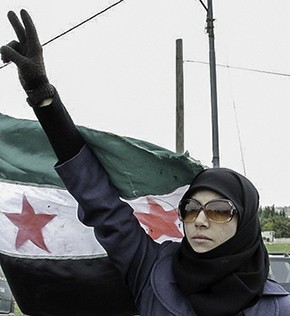Wisdom in doing nothing
Fresh from a meeting with Syrian rebels, Senator John McCain accused the Obama administration of standing idly by while a civil war tears Syria apart. While it once seemed inevitable that rebels would topple Bashar al-Assad, it now appears that the brutal dictator has the upper hand. The fighting could drag on for years and further destabilize the Middle East. Already an estimated 80,000 people have been killed, cities and towns have been demolished and 4 million people have been displaced. About a million refugees have poured over the borders into Lebanon, Turkey and Jordan.
McCain is correct that the situation is tragic. But that does not necessarily mean that the United States should intervene militarily. President Obama is rightly skeptical of direct intervention.
Syrian expert Joshua Landis at the University of Oklahoma describes the conflict as war between two Muslim factions: the Shi‘a and Alawites on one side and the Sunnis on the other. The United States could throw its support behind the rebel Sunnis, but there are hundreds of different rebel militias, many of which are radical Islamists. If the United States were to get involved, it would likely have a battle on two fronts: the Assad regime on the one hand and the radical Islamist groups on the other. Does the United States know how to bring peace to a fiercely divided country and put in place a stable government? Can that be accomplished through force? The continued violence and instability in Iraq—site of a previous American military intervention—offers many reasons to doubt.
In 1932, after Japan invaded Manchuria, H. Richard Niebuhr wrote an essay for this magazine titled “The Grace of Doing Nothing.” He argued that Christians do not have as much power to alter history as they tend to think. In the face of the Japanese invasion, he wrote, Christians should repent of their own involvement in the nation’s sins and trust that God is still working in history. Niebuhr’s brother Reinhold responded with an essay titled “Must We Do Nothing?” in which he argued that lack of moral purity should not prevent Christians from resisting aggression.
H. Richard Niebuhr’s point was not really that Christians should do nothing, however. It was rather that what Christians can do is limited by circumstance and by what is appropriate to a specific situation. “The inactivity of radical Christianity is not the inactivity of those who call evil good . . . It is not the inactivity of a resigned patience, but of a patience that is full of hope, and is based on faith.”
In the case of Syria, Christians should recall that they—and their political leaders—are not called or equipped to avert all tragedies or make all situations come out right. And it is not as though the United States can’t do anything. It can address the humanitarian crisis by supporting the countries hosting Syrian refugees, and it can continue to work toward a diplomatic solution, however complex and prolonged that effort might be.






